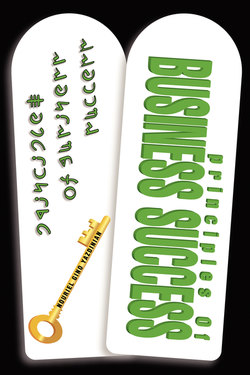Читать книгу Principles of Business Success - Gino Yazdinian - Страница 8
На сайте Литреса книга снята с продажи.
ОглавлениеDeciding Where You Want to Go; How to Set Achievable Goals
“The greatest barrier to success is the fear of failure.” ~ Sven Goran Eriksson
If you hope to have any success in business and in life, you must first have goals. There is no question about this. You can’t simply jump into the sky and expect to fly. You need to map out where you’re going and how you’re going to get there. Without real, tangible goals, you can’t achieve success, not because it’s impossible, but because you haven’t even defined what success looks like for you.
That’s what making goals is for—to make it clear in your mind where you’re going, what you hope to accomplish, and when you hope to accomplish it by. You can’t say that you’ve gotten anywhere if you haven’t the slightest idea of where it was you were going in the first place.
Contrary to the title of this chapter, the trick is to NOT make your goals achievable. That may sound contradictive, but it’s quite prudent. Most people make the mistake of shooting too low. They think of something they want, something they think they can get, and they set off to do it. Because they’ve made their goal achievable, they’re likely to attain it with some hard work. If that’s your definition of success—to plan to do something and do it, then congratulations; but that’s like saying, “by the end of the day, I’m going to finish all of the paperwork that’s on my desk.” You may achieve it, but what have you accomplished…and is that success?
You’ve heard the expression, “Shoot for the moon for if you miss you’ll still land among the stars.” Well, if you only shoot for the stars, you might not even get off the ground.
Something that is achievable can be brought to a successful end. Something that is achievable is commendable. But I challenge you to set a goal that you can’t say you’ve done it before or that you’re even certain it can be done. I challenge you to set your sights high, and do something that you can only look at and say: It’s Possible.
You must believe in possibility, in success, even though it is uncertain. So the chance for failure escalates considerably from the goal that was just achievable. You can set out to write a thesis on Maslow’s Hierarchy of Needs. It’s a noble goal and an achievable one. But can you write that entire paper with your left hand (assuming you are right-handed)? There’s no evidence saying that you can’t do it. There’s none saying that you can…but it’s possible.
You might fail. That’s a short sentence, but it can have a big effect on your mindset. When most people think that thought, they decide that they can’t do it. They might fail, and failing is the worst thing that can happen. On the contrary, the act of “thinking that failing is the worst thing that can happen to you” is actually the worst that can happen to you. Failure is probably the biggest gift you can receive.
“Failure is nature’s way to prepare you for greater responsibilities.” ~ Napoleon Hill
So make your goal big. Make it so big that you’re not even sure you can ever accomplish it. Then try like heck to do just that.
Achievable goals do have their place, however. Your overall goal should be a stretch. It should test your limits and force you to grow, but the smaller goals that you’ll set to reach this ultimate goal must be achievable. They should be tasks that you know you can do. Your daily goals can be as small as you need them to be as long as you do them. Small steps add up, and many small steps taken consistently are more productive than big steps now and then.
This is where your business plan comes in. You can’t have a successful business without a plan. Now that you have a long-term goal and a clear vision of where you want to be and when, you need to identify the steps you need to take to get you there. You also need to set up these steps in a logical order, creating a sort of harmony.
Think about writing a song. Great songs don’t come together because you have all the notes right. It’s only when the right notes are played in the right order and carried out successfully that you have a song.
It’s the same with your business. It’s not just the steps or tasks completed that will lead you to great accomplishments; when these items are completed in harmony, you will encounter success. With practice this is possible for anyone, and this book will be one of the sources to guide you through that process.
“The key is not to prioritize your schedule, but to schedule your priorities.” ~Stephen Covey
“Paying attention to short-term thinking (and thinkers) is only going to keep you relevant for a short time.” ~Steve Jobs
Key Points from Chapter 2
Set ambitious goals
Don’t let the fear of failure limit the magnitude of your goals
Set small daily goals in order to reach bigger, long-term ones
